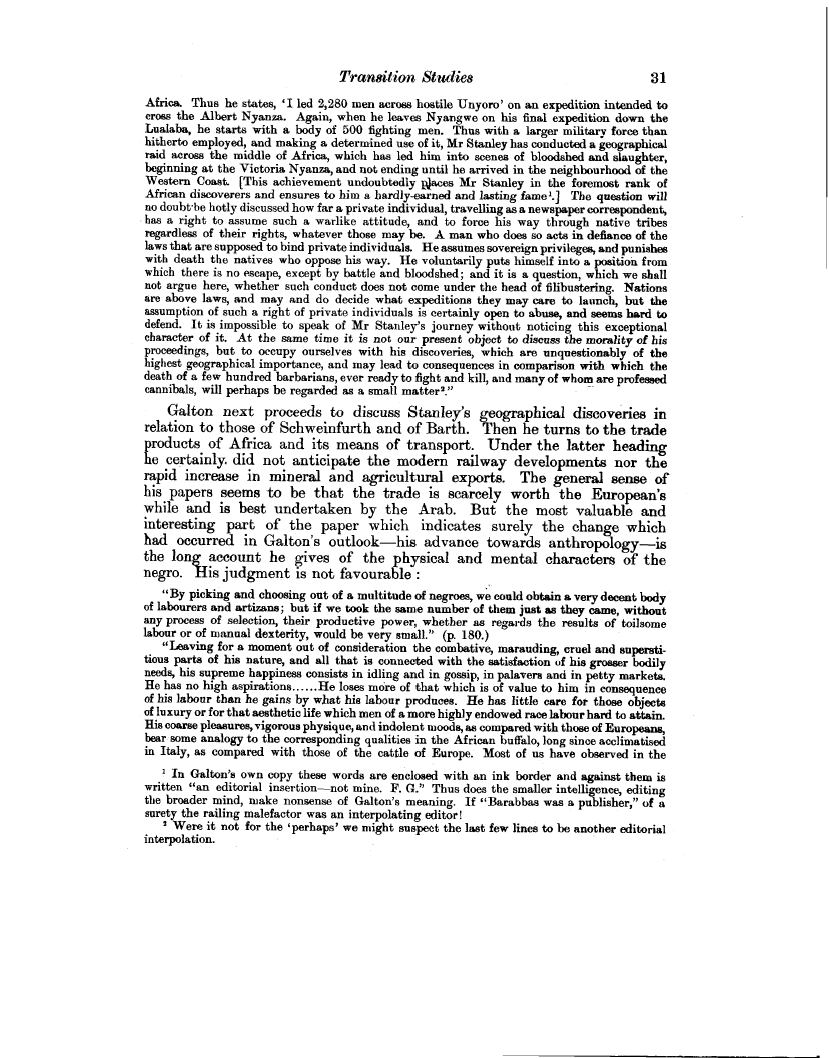Transition Studies 31
Africa. Thus he states, 'I led 2,280 men across hostile Unyoro' on an expedition intended to cross the Albert Nyanza. Again, when he leaves Nyangwe on his final expedition down the Lualaba, he starts with a body of 500 fighting men. Thus with a larger military force than hitherto employed, and making a determined use of it, Mr Stanley has conducted a geographical raid across the middle of Africa, which has led him into scenes of bloodshed and slaughter, beginning at the Victoria Nyanza, and not ending until he arrived in the neighbourhood of the Western Coast. [This achievement undoubtedly paces Mr Stanley in the foremost rank of African discoverers and ensures to him a hardly-earned and lasting fame'.] The question will no doubt-be hotly discussed how far a private individual, travelling as a newspaper correspondent, has a right to assume such a warlike attitude, and to force his way through native tribes regardless of their rights, whatever those may be. A man who does so acts in defiance of the laws that are supposed to bind private individuals. He assumes sovereign privileges, and punishes with death the natives who oppose his way. He voluntarily puts himself into a position from which there is no escape, except by battle and bloodshed; and it is a question, which we shall not argue here, whether such conduct does not come under the head of filibustering. Nations are above laws, and may and do decide what expeditions they may care to launch, but the assumption of such a right of private individuals is certainly open to abuse, and seems hard to defend. It is impossible to speak of Mr Stanley's journey without noticing this exceptional character of it. At the same time it is not our present object to discuss the morality of his proceedings, but to occupy ourselves with his discoveries, which are unquestionably of the highest geographical importance, and may lead to consequences in comparison with which the death of a few hundred barbarians, ever ready to fight and kill, and many of whom are professed cannibals, will perhaps be regarded as a small matter2."
pGalton next proceeds to discuss Stanley's geographical discoveries in relation to those of Schweinfurth and of Barth. Then he turns to the trade roducts of Africa and its means of transport. Under the latter heading e certainly, did not anticipate the modern railway developments nor the rapid increase in mineral and agricultural exports. The general sense of his papers seems to be that the trade is scarcely worth the European's while and is best undertaken by the Arab. But the most valuable and interesting part of the paper which indicates surely the change which had occurred in Galton's outlook-his advance towards anthropology-is the long account he gives of the physical and mental characters of the negro. His judgment is not favourable
"By picking and choosing out of a multitude of negroes, we could obtain a very decent body of labourers and artizans; but if we took the same number of them just as they came, without any process of selection, their productive power, whether as regards the results of toilsome labour or of manual dexterity, would be very small." (p. 180.)
"Leaving for a moment out of consideration the combative, marauding, cruel and superstitious parts of his nature, and all that is connected with the satisfaction of his grosser bodily needs, his supreme happiness consists in idling and in gossip, in palavers and in petty markets. He has no high aspirations He loses more of that which is of value to him in consequence of his labour than he gains by what his labour produces. He has little care for those objects of luxury or for that aesthetic life which men of a more highly endowed race labour hard to attain. His coarse pleasures, vigorous physique, and indolent moods, as compared with those of Europeans, bear some analogy to the corresponding qualities in the African buffalo, long since acclimatised in Italy, as compared with those of the cattle of Europe. Most of us have observed in the
i In Galton's own copy these words are enclosed with an ink border and against them is written "an editorial insertion-not mine. F. G." Thus does the smaller intelligence, editing the broader mind, make nonsense of Galton's meaning. If "Barabbas was a publisher," of a surety the railing malefactor was an interpolating editor!
a Were it not for the 'perhaps' we might suspect the last few lines to be another editorial interpolation.

